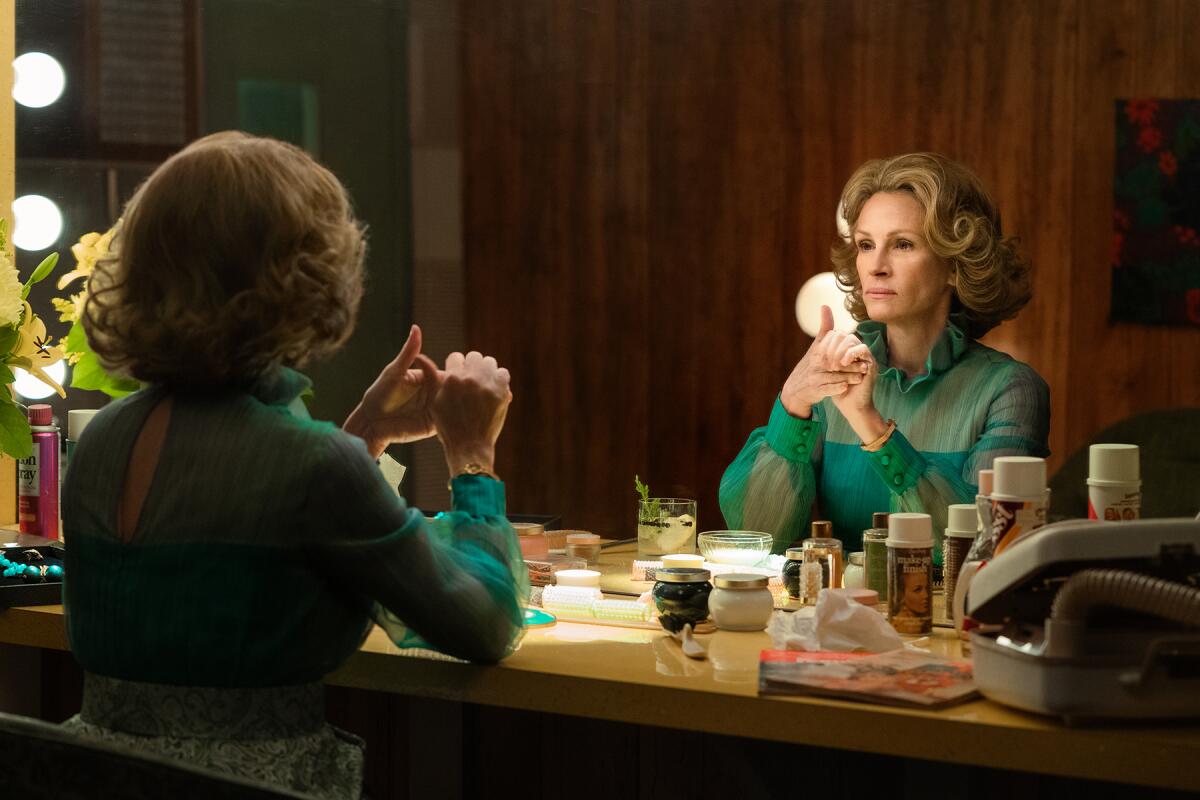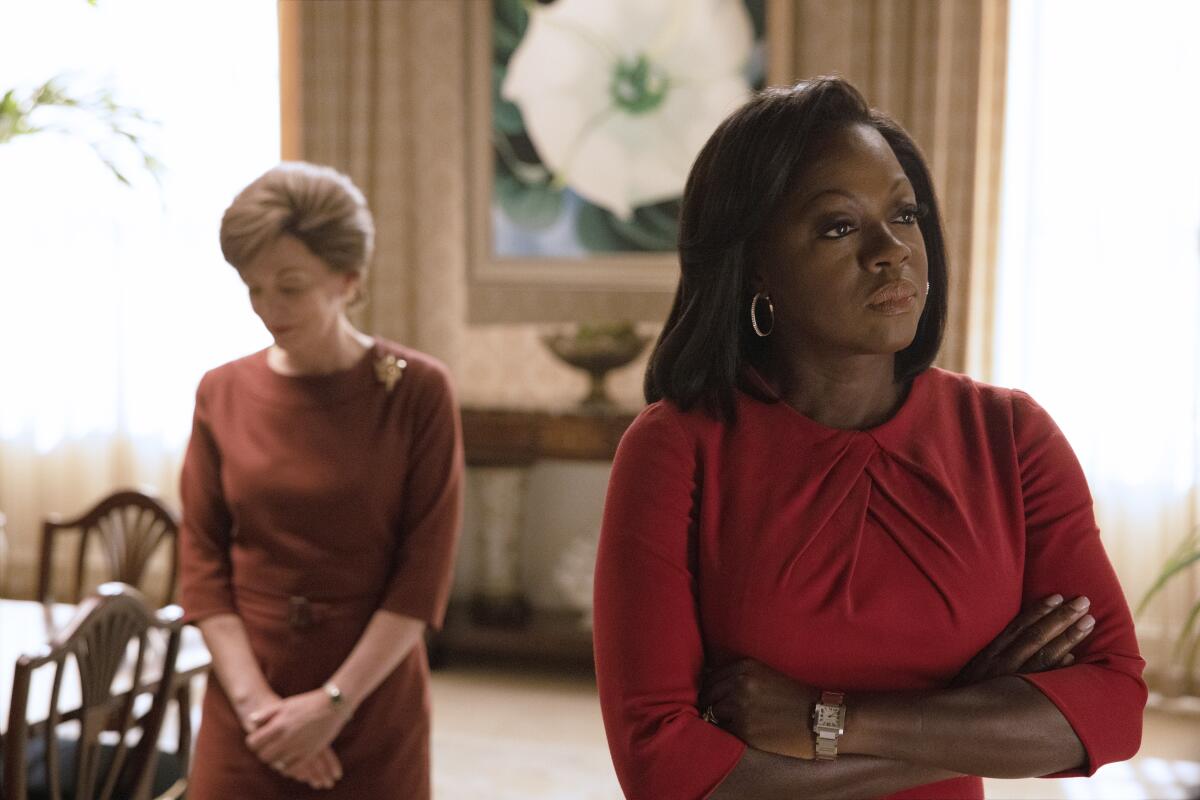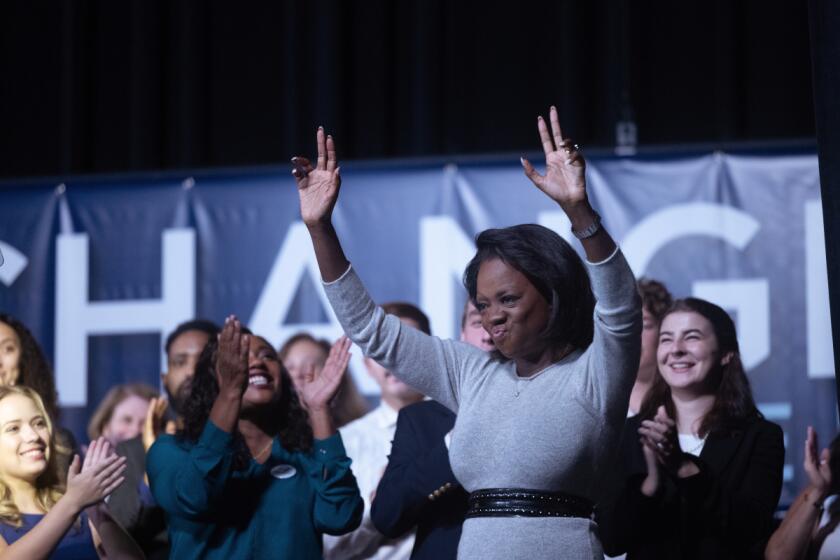How do you turn Washington, D.C., drama into enjoyable TV? Throw out the history books

“History isn’t written by the feeble masses,” says Watergate conspirator G. Gordon Liddy (Shea Whigham) in the opening seconds of “Gaslit,” premiering Sunday on Starz. “It is written and rewritten by soldiers carrying the banners of kings.” Maybe. But it’s definitely written by screenwriters and showrunners, which is why Jerry West is not unreasonably put off by what he regards as a libelous portrayal in HBO’s “Winning Time” — many viewers, incurious to know more, will settle for the imaginary version.
Two new more or less docu-dramatic series share an interest in women of Washington, D.C. — women not exactly behind the scenes, who had a tendency to speak up more than their politician husbands and their husband’s advisors and their husband’s parties would have wished them to. Both shows have a lot to say about marriage.
Alongside “Gaslit,” which makes media-happy Martha Mitchell the star she was in her heart — Julia Roberts plays her, for heaven’s sake — there is Showtime’s “The First Lady,” which premiered Sunday, a 10-episode round-robin biopic on the lives of Eleanor Roosevelt, Betty Ford and Michelle Obama. Compounded of established facts, debated facts and pure conjecture, they are by nature speculative, which is not to say implausible or lacking in insight. It’s the stuff of which Wikipedia searches are made.
Created by Aaron Cooley, “The First Lady” is a fairly straightforward march through True Facts of History, often as debated by its star couples. It’s been made with some commitment, requiring myriad period settings — a spinning dial of dates tells us when we are — and a huge cast that includes, in addition to headliners Gillian Anderson (Roosevelt), Michelle Pfeiffer (Ford) and Viola Davis (Obama), Kiefer Sutherland as FDR, Aaron Eckhart as Gerald Ford and O-T Fagbenle as Barack Obama, along with individual sets of friends, family and support staff, among whom you will find Ellen Burstyn, Regina Taylor, Lily Rabe, Clea DuVall, Dakota Fanning, Kate Mulgrew and Judy Greer.
Viola Davis is being slammed for exaggerating Michelle Obama’s pursed lips to the point of ‘duck face’ in ‘The First Lady.’ But fans have her back.
The three stories share space in each episode, echoing themes, events and life passages — youthful struggles, meet-cutes, marriages, marriages on the rocks, marriages off the rocks, moving into the White House, moving out of the White House — with the mutually reinforcing reminder, were one necessary, that all three women were models of personal candor and forward thinking, loved and hated by the people, but mostly loved. Late in the series, as Barack’s second term draws to a close, Obama receives a letter from Ford that pretty well sums up the point of the series, noting a first lady’s “ability to fill in for your husband where he cannot or will not go. First ladies and their teams are often the vanguards of social progress in this country … .” The dramatic downside of this framing is to reduce the complicated particulars of each president’s work to a repertoire of sighs and variations on “You don’t understand” and “My hands are tied.”
Ford’s relative vagueness in the present public mind makes Pfeiffer’s job in some ways the easiest, and the glamour she brings to the part is a reminder that Ford had an artistic past, studying dance with Martha Graham and modeling in New York before moving back to the Midwest, where she worked for department stores. In some ways, her story is the most interesting, if only because it’s the least known and most surprising. (We also get, unexpectedly, Gerald Ford joining her premaritally in a bubble bath — don’t know the authority for that — though he does keep his pants on.) In a story perhaps all too familiar, Anderson sports some major dental prosthetics, as all Eleanor Roosevelt portrayers seemingly must, but brings heart to the part. (As to Roosevelt’s well-documented though still-debated romance with reporter Lorena Hickok, played by Rabe, the show goes at far as it dares.) Davis has the hardest job of all, playing a media star still very much in the public eye, as well as one of the world’s most charismatic women; she has the voice down, but Twitter has already made much of strange things she does with her mouth. It’s presumably to get the look, but it makes her Obama seem unduly intense at times.
The back-and-forth structure does tend to put the brakes on each story, which can make the series feel a little tedious after a while. And, as celebratory as is its intent, “The First Lady” is also a reminder of how far a not-insignificant portion of the country has collapsed into superstition and willful ignorance, how the old fights still need fighting for, and that the rights these women worked to secure are currently in danger. It’s a little depressing.

Starring Roberts and Sean Penn as Martha and John Mitchell, and Dan Stevens and Betty Gilpin as John and Maureen Dean, known as “Mo” to those who watched Watergate unfold in real time, the sprightly “Gaslit” is something quite different, less concerned with politics than people. Where nearly every scene in “The First Lady” unloads historical exposition, decorated with a few sprigs of “real-life” dialogue, “Gaslit” goes long on the conjectured personal, with historical exposition introduced in a bundle here and there. Rather than tell the Watertale whole, it focuses on two marriages, that of the Mitchells — he the former attorney general running Nixon’s re-election campaign, she his talkative wife, a quasi-insider and pop-cultural figure of fun — and the Deans, he a White House counsel drawn into the “intelligence gathering” project that became Watergate, she a flight attendant with a yen to write romance novels (“nothing smutty”). Side stories focus on Frank Wills (Patrick Walker), the security guard who informed the police that something was up at the Watergate, and Liddy, with a little bit of a time devoted to the break-in and the investigation.
For the record:
7:55 a.m. April 22, 2022An earlier version of this article misidentified the actor who plays Nixon secretary Rosemary Woods as Maria Bamford. Woods is portrayed by Martha Kelly.
Created by Robbie Pickering, whose credits include “Mr. Robot,” “One Mississippi” and “Search Party,” and directed by Matt Ross (best known as an actor, for “Silicon Valley” and many other series and films), it is nominally, or one might say “legally,” based on the first season of the podcast “Slow Burn,” which deals with Watergate — though only its first episode, which covers Martha Mitchell. Though it can turn emotionally dark, the series has a considerable comic streak, with a supporting cast peppered with actors known for comedy, including Hamish Linklater, Nat Faxon and Patton Oswalt as Nixon’s men, Chris Messina as an FBI agent, Allison Tolman as a reporter and, in a brilliant bit of casting, Martha Kelly as Nixon secretary Rosemary Woods. A certain lack of solemnity, except as surrounds Martha Mitchell’s journey, signals that this is not the best source on which to base the report on Watergate you haven’t bothered to research. Indeed, the series can be watched as dance, a pair of alternating actorly pas de deux, set off by ensemble pieces, and is completely enjoyable as such.
‘Bad for my life, good for my show,’ says the creator and star of ‘Better Things,’ which made women in their 40s and 50s visible in new ways.
Although the end of Watergate is written large in a thousand histories, the individual fates of the Mitchells and the Deans are less well known; but where they’re headed here matters less than where they are at any moment. The Mitchells veer between sweet — he calls her “Martha Marshmallow,” she calls him “cupcake” — and sour; some of their scenes play like “Who’s Afraid of Virginia Woolf” set in a fancy Washington apartment. Roberts and Penn do so well playing people in love, when they’re in love, that you don’t care who they are, historically. The Deans have a bumpy road to bliss — he is a bit of a jerk when we meet him — but once they’re there, notwithstanding some soul-searching (“I’m just realizing I can’t just play the dutiful wife in your story,” Mo says at one point), they form a nontoxic partnership. She’s portrayed as more sensible (and liberal) than Dean, whose scruples, such as they are, may be swayed by a chance to meet the president.
Roberts is quite wonderful throughout, across a spectrum of attitudes, emotions and states of consciousness; apart from period hair, makeup and costumes, there has been no attempt to physically turn her into Mitchell — or to have cast her for her resemblance — which keeps you focused on the character rather than on the impression of the person, as Davis’ Obama sometimes does. (Stevens doesn’t look anything like John Dean, for that matter.) If on the other hand you had forgotten, or failed to notice, that John Mitchell was being played by Penn, you would be excused for not noticing, so completely have the prosthetic pixies turned him into that man’s likeness; here the physical transformation is so complete, you don’t quite notice the player. Penn is excellent — it feels like it’s been a while since we could just regard him as an actor — but it also points out the sad fact that there are few if any middle-aged, heavy-set bald actors Hollywood considers bankable.
‘Gaslit’
Where: Starz
When: Sunday, 8 p.m.
Rating: TV-MA (may be unsuitable for children under the age of 17)
‘The First Lady’
Where: Showtime
When: 9 p.m. Sunday
More to Read
The complete guide to home viewing
Get Screen Gab for everything about the TV shows and streaming movies everyone’s talking about.
You may occasionally receive promotional content from the Los Angeles Times.









